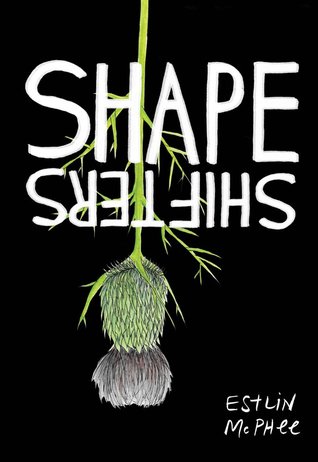
Shapeshifters
Estlin McPhee
Rahila’s Ghost Press, 2018
Review by Andrew W. French
In a poem aptly titled “Poetry,” Louis Dudek writes that the task of the poet is to “find a voice, / lost in the clutter and noise of existence, which speaks with perfect / clarity, with simplicity, out of the true self.” Vancouver-based writer Estlin McPhee’s debut poetry chapbook, Shapeshifters, possesses the effective speech Dudek describes here, and harnesses it in order to discuss the difficulty of determining the true character of one’s own voice and self.
Throughout the short collection, McPhee challenges us to grapple extensively with adolescence and the sense of evaporating innocence that accompanies it, various forms of loss, and the incredibly pressing issue of deciding on a favourite band member, culminating in a poetic quest to determine who the speaker is becoming. Shapeshifters reminds the reader of the pluralized nature of identity, suggesting we all struggle to capture our full selves with a single descriptor.
In “Remember How We Felt About Art at Sixteen,” McPhee suggests that poetry stems from a “cocktail of desperation and conviction” that tells you “something inside of you is important enough / to become a poem.” This origin of poetry certainly suits the works composing Shapeshifters, which brilliantly meditates upon these ‘somethings’ in order to get at another element at the heart of our existence.
Perhaps a general lack of stasis best characterizes the overall tone of these poems, as shifting perceptions of love, art, gender, and sexuality become foregrounded as one reads on. The speaker effectively instills a nostalgic longing for the comfortably reliable nature of the past in the reader, making it hard not to fondly recall one’s own formative years while flipping through this book. Making a home out of the dynamic universe of one’s emerging maturity is the challenge that McPhee places before us and, as they write in “Prayer for our Past Selves,” it is “this strange translation / through time” that separates us from our agency throughout this process.
Not to be overlooked is the fact that McPhee’s poems are written beautifully from a technical standpoint, and subtle repetition of some more notable literary techniques throughout the chapbook unifies the individual works that compose it. The metaphor of unspooling and unthreading exemplifies this, recurring in a number of pieces as a figurative representation of the deconstruction of various processes bound up in personal development. Fire imagery similarly strides from page to page, each time signifying something new and prompting us to consider the sense in which one image may possess or signify a plurality of meanings, an appropriate message given McPhee’s focus on the multifaceted nature of the self.
Much like the fire imagery, the poet’s keen sense of the natural is evident throughout Shapeshifters, and it juxtaposes brilliantly against the backdrop of metropolitan Vancouver. In particular, forests and water appears multiple times as quasi-antidotes to the burdens of city living, such as in “Young Hearts Run Free,” as the speaker drops into the ocean “to let something larger than myself hold me up.”
While the poems in this book inhabit spaces that could often use a bit more light, the darker subject matter is communicated in a comfortable and comical voice that provides some reassurance and relief, and the poems are ordered in a way that allows the reader’s mood to change as the pages go by. Almost all moments of lightness in Shapeshifters still stealthily result in existential considerations, as in “Why I Love Boy Bands,” the first stanza of which gives us the clever, significant lines “maybe it has something to do / with gender – well, what doesn’t? / Truth be told, my gender identity might be boy band.”
A stunning debut, this is an important chapbook that refuses to shy away from the gritty details of determining who we are. McPhee is a writer to watch and a poet to admire, whose (at times) insecure speaker comfortably builds a home in a voice that reads enjoyably akin to a philosophically informed confessional. For the young, the young-at-heart, and those who struggle even a little to squeeze into constricting labels, Shapeshifters is a delightful chapbook that is guaranteed to linger in the reader’s mind, speaking brilliantly to issues of this contemporary moment.
Andrew W. French is an emerging poet from North Vancouver, currently pursuing an MA in English at UBC. His poems and reviews have previously appeared in The Slippery Elm, Cascadia Rising, Symposium, Strix Leeds, Snapdragon, and other literary journals across North America and the UK. Andrew can be found on Twitter at @mrandrewfrench.